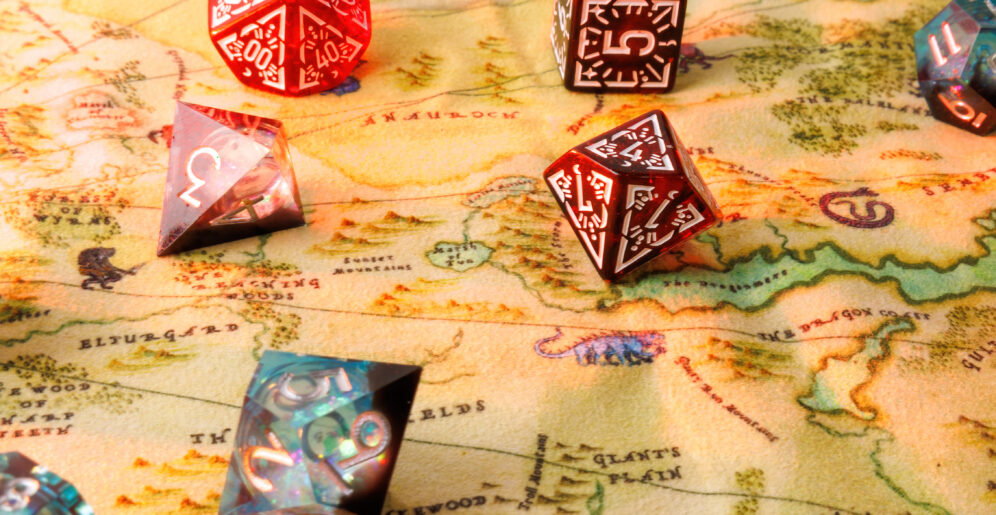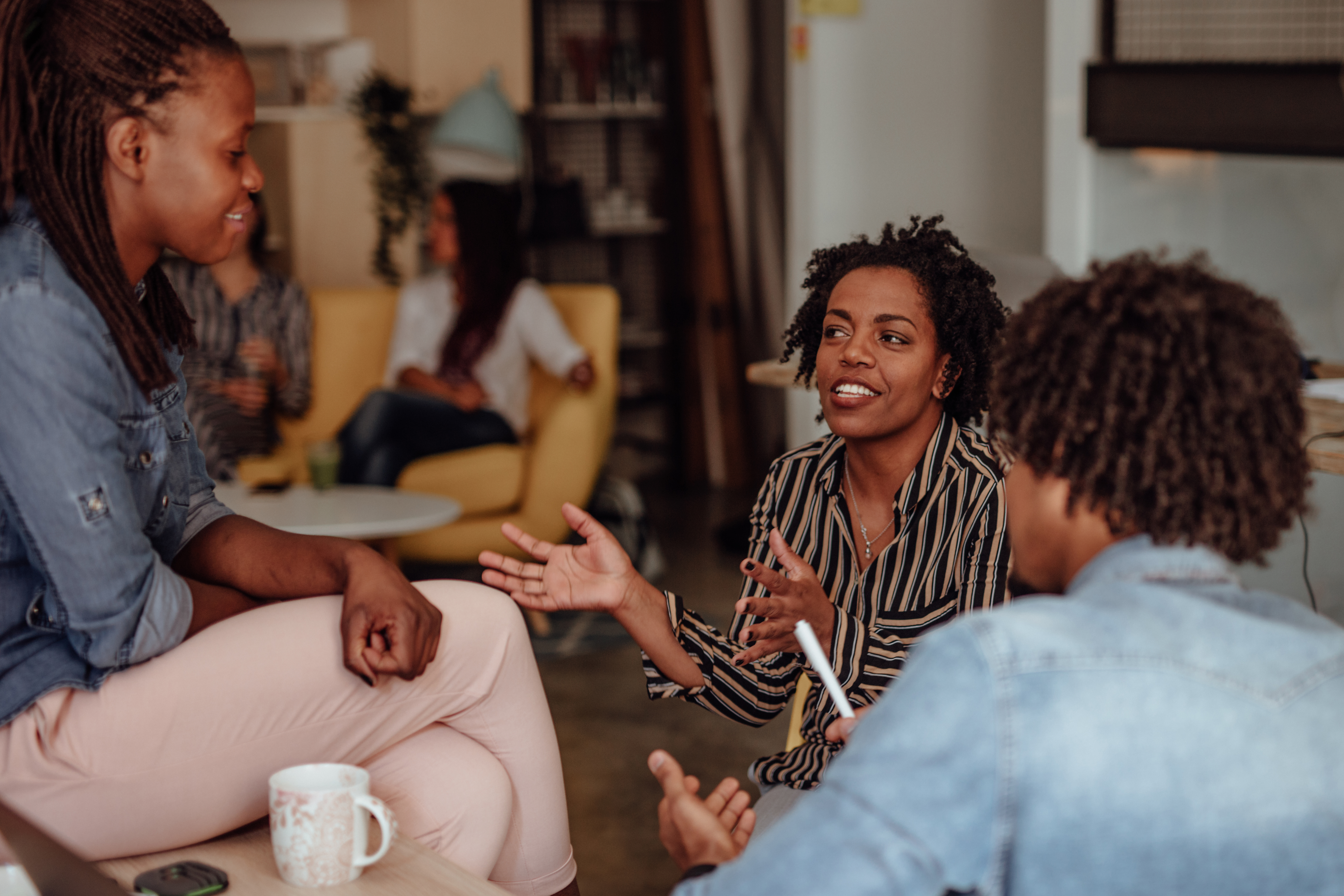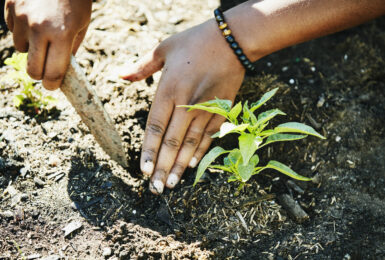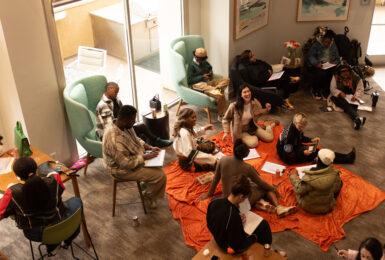
Culture
Black And Queer Storytellers Are Transforming Fantasy Into Healing Spaces
You’ve just arrived home from work after a stressful day, ready to blow off some steam. Your supervisor was micromanaging you all afternoon, you feel burnt out, overwhelmed, and underappreciated. You open your laptop, hop on Zoom, and join your teammates and are magically transported to the Forgotten Realms. In this foreign land, you are now a powerful healer who has lost everything they’ve ever known but somehow is surviving with a little help from their friends. You are a necessary part of a group of adventurers on their way to find treasure, save the innocent, and punish the wicked along the way. Your ability to channel divine power and arcane magic is balanced by your sense of purpose. Every decision you make matters and can alter your outcomes, ultimately changing your path and the path of those in your group. In this intersection of reality and imagination, you can be and do anything you want.
For Black, queer, and alt folks, the realities of the world can feel even more complicated, with each added identity carrying a unique nuance. Storytelling, roleplay, and narrative become opportunities for worlds to collide, healing to occur, and understanding to be explored in a safe space. Imagining ourselves as someone else, even someone more powerful, more loved, or practically invincible, makes sense in the worlds we can create.
Intersectionality, first defined by Kimberlé Crenshaw, gives us a way to see how systems of power overlap rather than treating race, gender, class, or LGBTQ identity as separate struggles (Crenshaw, 2020). The inclusion of LGBTQ and BIPOC voices in gaming is more than representation, it’s reclamation. Fantasy characters have long provided an opportunity for people of color to experience realms, abilities, and power unknown in everyday life. Tabletop role-playing games (TTRPGs) create a collaborative space to be anything you’ve dreamed of being, sometimes with nothing more than a roll of a D20 dice, a few hours of time, some laughs, and maybe even a few tears.
TTRPGs have been at the heart of gaming culture for decades, showing up everywhere from Stranger Things to Buffy the Vampire Slayer. More recently, shows like The Legend of Vox Machina and Delicious in Dungeon have made RPG-style storytelling accessible to a wider audience. Still, many mainstream portrayals lack the diversity that real-life tables hold. Enter Dimension 20’s Dungeons & Drag Queens, a campaign featuring Drag Race royalty Bob the Drag Queen, Jujubee, Monét X Change, and Alaska Thunderf***, where queer joy and camp flourish in a fantasy setting.
For many Black and queer gamers, representation like this is powerful—but even more powerful is creating spaces of our own. Maia Wilson, a passionate Game Master (GM) and narrative play story teller, who has tried over 44 game systems, shared how storytelling connects her with others and helps her amplify what she already loves about herself:
“Storytelling has helped me feel more connected to other people, and I’ve realized more and more what a powerful art form it is. In terms of self-discovery, it has helped me better understand who I am… being a GM has highlighted the things that were already in me, which has been a really fun process.”
— Maia Wilson, People can find me and my work here: https://bit.ly/maiasgameroom
Neo @Neosoulgod, a black GM who has built a strong community for black and queer gamers on TikTok and Discord, echoed this sentiment, emphasizing the importance of carving out explicitly Black and queer spaces:
“GMing is about building the kinds of spaces I wish I had growing up—spaces where Blackness and queerness aren’t just allowed but celebrated. Storytelling lets me explore who I am at the intersections of those identities, while also opening the door for my players to do the same. It’s self-expression, yes, but it’s also community care.”
Neo also shared that roleplay is more than escape, it can become a tool for processing real-world challenges:
“I’ve seen Black players use roleplay to process the weight of systemic oppression by reimagining themselves as powerful, free, and unbound. I’ve seen queer players test out names, pronouns, or expressions of gender they were still figuring out in real life. Those moments show how roleplay isn’t just escapism—it’s rehearsal for liberation.”
Both Maia and Neo point out what mental health professionals also realize: storytelling is deeply therapeutic. Narrative therapy, a counseling approach that helps people “re-author” their lives by viewing themselves as the main characters in their own stories, aligns perfectly with the mechanics of TTRPGs. When we build characters, explore relationships, and make decisions in-game, we are practicing choice, agency, and resilience in ways that can translate into real life.
For Black and LGBTQ+ players especially, these spaces can provide both healing and empowerment. Neo imagines a future where Black queer joy is not the exception but a default:
“I think healing comes when we stop just surviving in these spaces and start thriving, telling stories that center our joy, our futures, and our complexity.”
Through collaborative play, BIPOC and LGBTQ+ players can rewrite narratives, transforming stories of struggle, erasure, or danger into stories of celebration, empowerment, and connection. This is beneficial for increasing mental health support and suicide prevention, where social connection and a sense of belonging provide self expression, stress reduction and resilience. Nearly half of Americans use creative activities as hobbies to relieve stress and anxiety. Those who reported very good or excellent mental health tended to engage in these activities more frequently than those who reported lower self-rated mental health (American Psychiatric Association, 2023).
Tabletop role-playing games and other collaborative storytelling practices can serve as a form of group therapy without being labeled as such, reducing stigma and offering long-term friendships. While some therapists specialize in Play Therapy, Narrative Therapy, or Collaborative Storytelling Group Work, finding therapists of color who offer these services across different states can be challenging. When these approaches are accessible, they create spaces where participants can engage with one another, often anonymously and under the guidance of a licensed mental health professional, fostering deeper connection, shared vulnerability, collaboration, and a sense of belonging that is frequently missing in traditional therapy settings.
In many ways, tabletop role-playing games such as Dungeons & Dragons demonstrate what healing communities can look like. They are diverse, cooperative, and imaginative, offering players the opportunity to envision new possibilities and practice hope, creativity, and connection in ways that extend far beyond the table.
In many ways, TTRPG tables, whether virtual or in person, offer more than just a game; they offer community, shared stories, and a space where collective imagination makes anything possible. They allow kinship and hope to take center stage as the characters we create come to life: heroes who look like us, sound like us, and carry our struggles and triumphs.
Storytelling has always held a sacred place in African and other Indigenous traditions. Whether through proverbs, lore, or folktales, stories have taught lessons, preserved wisdom, and guided us toward deeper understanding of ourselves and the world around us. In our own way, when we gather around a table or a virtual map, we are continuing that tradition. Whether we are celebrating our victories or mourning our pain, these shared narratives become a form of group healing.
For communities impacted by systemic oppression, collective play can be a radical act. Survival mode often teaches us to isolate, to rely only on ourselves, but play invites us to connect. Research shows that spending time with friends can ease symptoms of depression and improve overall well-being. TTRPGs remind us of this truth: that we are not alone, that support is available, and that our strength multiplies when shared.
Imagining ourselves as adventurers, warriors, healers, kings or queens can be a powerful tool for mental health. These stories offer perspective, hope, and permission to dream bigger about what we are capable of, both in the game and in our real lives. As suicide prevention efforts grow, there is an urgent need to think beyond traditional models of care and lean into approaches that are accessible, culturally relevant, and rooted in joy.
Our narratives, our lives, our struggles, and our victories can help us see the world more clearly, stay grounded in our purpose, and remind us that we are never fighting alone. The battles we face may be challenging, but our story still continues. Our next chapter could be even better, as long as we allow space for the plot.
Learn more about Game Master and Storyteller Maia Wilson here: https://bit.ly/maiasgameroom
Learn more about Creative Writer and Game Master here: tiktok.com/@neosoulgod
Get The Latest
Signup for the AFROPUNK newsletter




